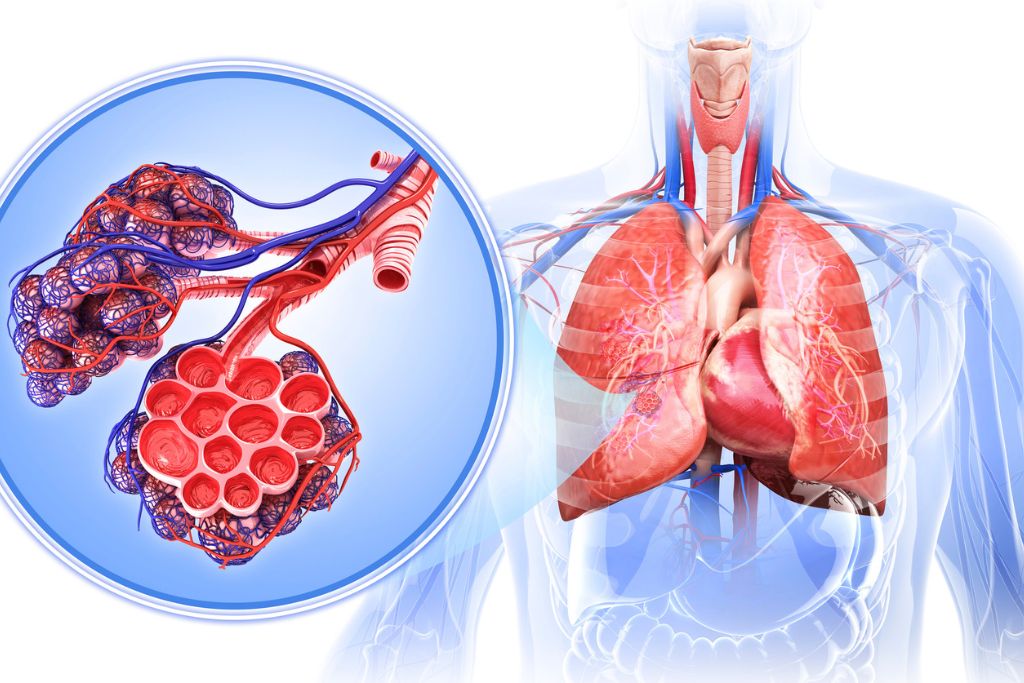Introduction to the Effects of Smoking on the Respiratory System
Rise and shine! It’s a brand-new day, filled with endless possibilities. You stumble out of bed, rub the sleep from your eyes, and reach for that familiar pack of cigarettes sitting on your bedside table. Without hesitation, you light up and take that first-morning drag. Ahh, the blissful rush of nicotine coursing through your veins… But have you ever stopped to think about what smoking that cigarette is doing to your respiratory system? Well, my friend, it’s time to peel back the smoky curtain and explore just how this seemingly innocent morning ritual can wreak havoc on your lungs and overall respiratory health. So grab a seat (and maybe even a glass of fresh air) because we’re about to dive deep into the effects of smoking on your precious breathing apparatus.

Grabbing attention with an invigorating tone while introducing the topic at hand can help engage readers right from the start. This sets the stage for them to continue reading and learn more about how smoking affects their respiratory system in specific situations, like mornings
What Happens to Your Lungs When You Smoke a Cigarette in the Morning?
When you wake up in the morning, your body is craving a fresh start. But for those who reach for a cigarette first thing, that fresh start quickly turns into a harmful habit. Smoking a cigarette in the morning has immediate and long-term effects on your respiratory system, especially your lungs.

As soon as you take that first puff, the smoke fills your airways and enters your lungs. The chemicals in cigarettes irritate the delicate tissues of your respiratory system, causing inflammation and damage. Your lungs are designed to filter out pollutants from the air we breathe, but smoking overwhelms this natural defense mechanism.
The short-term effects of morning cigarette smoking can be felt almost immediately. You may experience coughing fits or wheezing as your lungs try to expel the toxins from the smoke. This irritation can also lead to shortness of breath and tightness in the chest. Over time, these symptoms can become more severe and persistent.
But it’s not just short-term effects that should concern you; long-term consequences are even more alarming. Regularly smoking cigarettes in the morning increases your risk of developing chronic respiratory conditions such as chronic obstructive pulmonary disease (COPD) and lung cancer.
Smoking also affects other organs within your respiratory system beyond just your lungs. It damages tissues throughout your airways, including your throat and mouth, increasing the likelihood of oral cancers or throat infections.
If you’re ready to break free from this harmful habit and improve your respiratory health, there are steps you can take towards quitting morning cigarette smoking:
Set a quit date: Choose a specific day when you will stop smoking altogether.
Seek support: Reach out to friends and family members, or join support groups that understand what you’re going through.
Find healthy alternatives: Replace cigarettes with activities like exercise or hobbies to distract yourself.
Get professional help: Consider talking to a healthcare professional about medications or therapies available to assist in quitting.
Short-Term Effects of Morning Cigarette Smoking on the Respiratory System
When you light up that cigarette first thing in the morning, it may feel like a necessary pick-me-up, but have you ever thought about how it affects your respiratory system in the short term?
As soon as you inhale that puff of smoke into your lungs, your airways become irritated. The hot and toxic chemicals present in cigarettes cause inflammation and narrow the air passages. This can lead to wheezing, coughing, and shortness of breath. You might even find yourself reaching for that inhaler more often than usual.

Not only does smoke irritate your airways, but it also impairs the function of tiny hair-like structures called cilia, which line your respiratory tract. These cilia usually work hard to move mucus out of your lungs and keep them clean. However, when exposed to cigarette smoke, they become paralyzed or damaged, preventing them from effectively removing harmful substances.
Furthermore, smoking a cigarette in the morning increases carbon monoxide levels in your blood. This dangerous gas binds tightly with hemoglobin in red blood cells and reduces their ability to carry oxygen throughout your body. With decreased oxygen supply to vital organs, including those within your respiratory system such as the lungs and bronchial tubes, their functioning is compromised.
In addition to these immediate effects on respiration itself, increased risk for infections such as sinusitis (sinus infection), laryngitis (voice box infestation by a virus), etc. is caused by smokers’ weakened immune systems, making fighting off bacteria or viruses more difficult than non-smokers, leading to these diseases being acute rather than mild cases seen among non-smokers!
All these short-term consequences should be enough motivation for anyone considering quitting morning cigarette smoking for good! It’s time to prioritize our respiratory health above all else.
Remember: this article is just scratching the surface when it comes to understanding how smoking impacts our bodies—especially our respiratory systems. Stay tuned for the next sections, where we’ll delve
Long-Term Effects of Morning Cigarette Smoking on the Respiratory System
Over time, the habit of smoking a cigarette in the morning can have devastating effects on your respiratory system. The continuous exposure to harmful substances found in cigarettes can lead to serious health issues.
Long-term morning cigarette smoking can cause chronic bronchitis, which is characterized by persistent inflammation and irritation of the bronchial tubes. This condition leads to excessive mucus production and difficulty breathing, making everyday activities challenging.

Smoking damages the cilia in your lungs. These tiny, hair-like structures are responsible for clearing out mucus and foreign particles from your airways. When they become paralyzed due to smoking, toxins accumulate in their lungs, increasing the risk of infections such as pneumonia.
Additionally, habitual morning smokers may develop emphysema over time. This condition involves damage to the alveoli and small air sacs where oxygen exchange occurs in your lungs. As a result, you experience shortness of breath even with minimal exertion.
Furthermore, studies have shown that long-term cigarette smoke exposure increases the risk of developing lung cancer significantly. The carcinogens present in tobacco smoke directly damage DNA within lung cells and promote abnormal cell growth.
It’s important to note that these are just some examples of how morning cigarette smoking affects your respiratory system over time; there are many more detrimental effects yet to be discovered or fully understood.
How Smoking Impacts Other Organs in the Respiratory System
When we think about the impact of smoking on our respiratory system, we often focus solely on our lungs. However, it’s important to recognize that smoking affects other organs within this vital system as well.
One organ that is directly impacted by smoking is the trachea, commonly known as the windpipe. The smoke from cigarettes irritates and inflames the lining of the trachea, leading to chronic coughing and an increased risk of infections such as bronchitis.

In addition to the trachea, smoking also affects the bronchi and bronchioles within the respiratory system. These are responsible for carrying air in and out of your lungs. Smoking causes these airways to become narrow due to inflammation and excess mucus production. This can lead to difficulty breathing and a higher susceptibility to respiratory illnesses like pneumonia.
Furthermore, let’s not forget about our vocal cords! Smoking damages these delicate tissues, resulting in hoarseness or a raspy voice-over.
Smoking has detrimental effects on another crucial component of our respiratory system, the alveoli. These tiny air sacs are responsible for oxygen exchange in our lungs. Unfortunately, smoking destroys them gradually, reducing lung capacity and making it harder for you to breathe properly.
It’s clear that when we light up that morning cigarette (or any cigarette), not only do our lungs suffer, but so do other integral parts of our respiratory system. It serves as a reminder that quitting this harmful habit is vital for maintaining overall health.
Tips for Quitting Morning Cigarette Smoking and Improving Respiratory Health
Now that you have a better understanding of how smoking a cigarette in the morning affects your respiratory system, it’s time to take action toward quitting this harmful habit. Here are some tips to help you quit morning cigarette smoking and improve your respiratory health:

Set a quit date: Choose a specific date to stop smoking cigarettes in the morning. This will give you a clear target to work towards.
Seek support: Reach out to friends, family, or support groups who can provide encouragement and guidance during your journey to quit smoking.
Use nicotine replacement therapy (NRT): Consider using NRT products such as patches, gum, or lozenges to help reduce cravings and manage withdrawal symptoms.
Find healthy alternatives: Replace the habit of lighting up with healthier activities like going for a walk, practicing deep breathing exercises, or enjoying a cup of herbal tea.
Avoid triggers: Identify situations or environments that typically lead you to smoke in the morning and try to avoid them whenever possible.
Stay active: Engage in regular exercise, as it can help distract from cravings and improve lung function over time.
Practice stress management techniques: Develop healthy coping mechanisms such as meditation, yoga, or journaling to deal with stress without turning to cigarettes.
Stay motivated by tracking progress: Keep track of how many days you’ve been smoke-free and celebrate milestones along the way as reinforcement of your success.
Surround yourself with non-smokers: Spend time with individuals who do not smoke regularly so that you’re not constantly exposed to triggers or temptation.
Seek professional help if needed. If necessary, consult healthcare professionals who specialize in smoking cessation programs for additional guidance and support tailored specifically to your needs.
Remember that quitting morning cigarette smoking is not an easy task, but taking steps toward improving your respiratory health will be worth it eventually. By implementing these tips and staying committed to your goal



